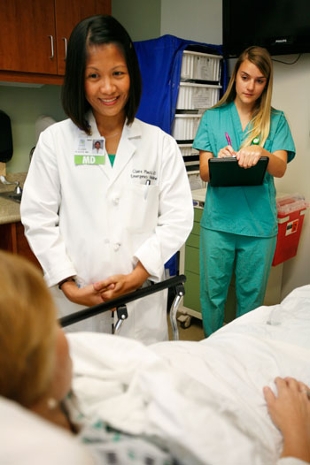Medical Scribes Improve Health Communication
News
When Dr. Claire Plautz makes her rounds in the emergency department at Rockingham Memorial Hospital, she doesn't bother jotting down notes. Instead, Plautz brings along a medical scribe to provide the clinical documentation so that she can focus on what she does best: taking care of patients.
"I can sit back, look the patient in the eye and ask questions like I were carrying on a conversation," Plautz says. "Before I had scribes, I would ask the patient a question, like 'are you having chest pain?' Then I'd write down their response, ask a follow-up question, write down the response. Often times I'd be writing things down without even looking at the patient because I'd be focused on what I have to insert in the medical record."
The use of scribes is becoming more common in hospital emergency rooms, where patient volumes are increasing in step with the number of Americans who lack health insurance and don't have a primary-care physician. "Something has to change," Plautz says. "Either we need to hire more docs, or I can hire someone to help me focus on what I do best. I don't think you'll find any doc who will tell you their favorite part of practicing medicine is taking notes or dictating into a machine."
Plautz started the emergency department scribe program at RMH in October 2010 after having worked with scribes during her residency and subsequent fellowship at the University of Virginia Medical Center. "It's communication that every patient deserves from their doctor," she says. "Scribes are more thorough, they're well trained and there's a continuous feedback loop." The result is better communication between patient and provider and a medical record that's more accurate and more reflective of the patient's visit.
Today the RMH scribe program, part of the JMU-RMH Collaborative, employs seven pre-medical students, four of whom are recent Madison graduates. Admission to the program, which includes a modest stipend, is competitive, and students who make the cut must undergo intensive training in medical terminology and coding as well as patient confidentiality issues before being paired with a doctor.
While they are not allowed to administer care, JMU scribes say the experience of sitting in on real-life interactions in the ER and conversing with RMH staff has been career-affirming, and the professional knowledge they have gained has given them a leg up in applying to medical schools.
Chief scribe Thais Teotonio, a 2010 JMU health sciences graduate who will enter medical school in the fall, likes to boast that after only a few months as a scribe at RMH she had a better understanding of medical terms and procedures than her older brother, then a second-year med student. "Of course, now he's passed me. But it was great being able to talk to him at almost the same level."
"With the scribe program, you're assisting the physician, you're not just running around filling water cups for patients," says Matthew Wallace, an honors student at JMU who graduated earlier this month with a degree in biology. "You actually have a hand in their care."
"I always knew I wanted to go into medicine, but at times you lose sight of that goal because your studies are so focused on the cellular level," adds fellow biology graduate Erin Albery. "So seeing it all come to life in the ER is amazing. And to be able to go into medical school saying, 'I've had two years of experience in a clinical setting,' that's huge."
Better communication
Medical scribes are on the front lines of the current push in health care toward better communication. According to the JMU Health Communication Institute, up to 65 percent of health care consumers are dissatisfied with the interaction between themselves and their provider. Further, it has been suggested that half of all illnesses in the U.S. could be lessened or abolished if health care professionals were more effective communicators.
Many medical schools in the U.S. are now weeding out candidates who communicate poorly, and to become licensed physicians, students are being assessed on how well they acknowledge patient concerns, ask about feelings and show empathy.
"Care doesn't just involve a prescription pad," says Dr. Sharlene Richards, assistant professor of communication studies at JMU. Open lines of communication "may help uncover a complex diagnosis, help a patient address longstanding health problems such as obesity, or lead to a patient more effectively managing a health issue such as diabetes." Also, a strong link exists between effective communication and better patient outcomes, including improved healing, she says.
Some of the barriers in health communication are occupational. For example, research has shown that listening skills and patient empathy can decline in doctors who have been on call for an extended period of time. Other obstacles are personal, such as an established physician not wanting to work collaboratively with someone they see as having less knowledge and expertise.
Of course, good communication doesn't just fall on the shoulders of the provider. The patient is equally involved in the sharing of information, notes Dr. Keith Richards, JMU instructor of communication studies. Some patients may feel embarrassed or intimidated in a medical setting and therefore not ask questions or listen effectively. Creating a relationship that works for both parties should be the goal, Richards says. "Some patients want to be very involved and others not at all, and this style needs to be matched by the person treating them."
By James Heffernan ('96), JMU Public Affairs

